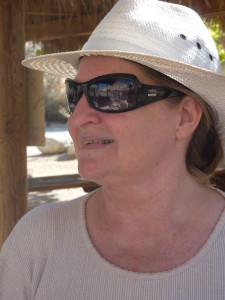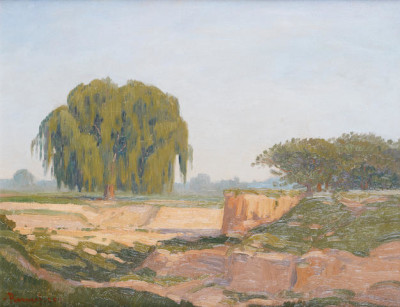The Yesterday Today and Tomorrow Tree grew in the garden of our home in South Africa. It usually flowered for one season, purple and white blooms sending their perfume through my parents’ bedroom window. In the year my father died, it flowered beyond its time and until after his death.
He died in Cape Town, at eight o’clock on a Tuesday morning. I would never again be held against his warm, solid chest, stand with him on the verandah, looking out towards the ships sailing to Cape Town where my sister lived.
Never again go walking with the dog, my hand in his, a quiet, brown, good hand. The way he’d put his hands in his pockets or deliberately, absently, wipe his nose, precisely refolding the handkerchief and returning it to his pocket. Never again sit with my brothers in the evening and listen to stories from some endless, invisible, inner store. Stories from the large armchair; under the Mulberry Tree; in the car on the journey up to his brother’s farm, Blue-Gill Waters.
I remember the coolness inside the farmhouse, stone floors, bedroom walls covered in deep blue linen. The memory of trees growing down the garden towards the dam. Rooted for so many years, they had joined branches, splitting the earth from the sky, bottling the air in green light. The way the garden slowly let go, turning to untended field, long grasses, crickets, cow dung, and softly slapping water beneath the willows.
After his death, we would sit there for hours. It was a time of speechless mourning under the willow trees. I wonder today what the adults thought then. That a child is exempt from despair? That a child adapts, gets over it? Speechless, clinging silence, the rip in the air. Legitimate, un-witnessed suffering of children in full sight of the adult world. Who saw a young boy make the decision that he was now the man and must protect his sister and younger brother? It happens all the time, in all languages, in every place. But what often goes unseen is the terrible wrenching effort of transition, that moment when a young child realizes with all his being that he is utterly alone. There is no language for this individual journey of realization, no matter how often it happens, every day, every second, everywhere. As if the million duplications of something could possibly diminish the totality of meaning in one small person’s heart.
The only comfort then came from the willow trees, those long green strands murmuring against our backs, ends drifting in the water like lost souls. An obvious image. Except that the strands were forever bound to the trees. We never once came down to the dam and found the branches of the Willow trees torn from the trunks and floating in the drowning current.
 Noel Canin was born and raised in South Africa during the Apartheid era. She has lived in Israel since 1968 and has two children and five grandchildren. She is a translator from Hebrew into English and has also trained as a Hakomi psychotherapist. She has published poetry in various journals in Israel, the USA and England and has self-published a first collection of poems in the USA. Noel Canin is currently writing a novel.
Noel Canin was born and raised in South Africa during the Apartheid era. She has lived in Israel since 1968 and has two children and five grandchildren. She is a translator from Hebrew into English and has also trained as a Hakomi psychotherapist. She has published poetry in various journals in Israel, the USA and England and has self-published a first collection of poems in the USA. Noel Canin is currently writing a novel.
Painting by Jacob Hendrik Pierneef (South African, 1886-1957), Willow tree



What a powerful piece, honoring your father and your own legitimate grief as a child!
Working with children for twenty years, I’ve so often seen their feelings be considered small and inconsequential because of the little body they’re contained by and felt the wrongness of it.
Thank you for sharing your story!
Thank you very much Kristen, as a therapist I often see an inner child within the adult who never experienced being seen or heard in her grief and my experience is a very rich and useful tool today.